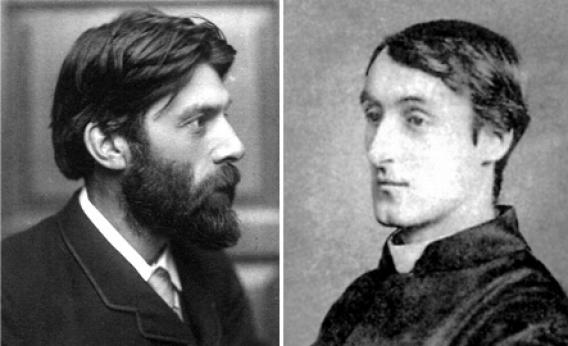With a Little Help From My Friends
Robert Bridges made Gerard Manley Hopkins a poetry superstar.

Photos courtesy of Wikimedia Commons
Life is unpredictable, and that general truth has plenty of illustrations in the course of artistic reputations. The hack movie directors of one decade may be recognized as geniuses in the next, while those hailed as serious artists are revealed as pretentious phonies in the ascent (or spiraling Tilt-A-Whirl?) of time. In the 18th century, many esteemed Colley Cibber more highly than Alexander Pope. In living memory, John O'Hara was well-known and influential, and Frank O'Hara was not.
In the 20th century, the poet laureate of England had a Jesuit friend who wrote poems but had died young without publishing a book. Nearly 20 years after that death, the laureate compiled and edited a volume of his friend's peculiar, tormented poems. The story is familiar to poetry readers: Gerard Manley Hopkins is a central genius of modern poetry, and his friend Robert Bridges, the benefactor of Hopkins' reputation, is not nearly as much read or highly esteemed.
Hopkins' sonnet beginning “No worst, there is none” has an explosive energy and innovative stretching, even fragmenting, of language and form. Bridges' “Low Barometer” is quieter, less innovative. For some readers, the two poems may demonstrate the difference between a work that is great and one that is quite good.
Bridges' poem is impressive. The low barometer, “when Air has loosed/ Its guardian grasp on blood and brain” indicates a storm, inside us and in the air, with the distinction dissolving and Bridges extends the metaphor with force, until the “storm-spredd cloak” gathers again. The house of Reason, in his terms, remains haunted though the phantoms are repressed. In the language of Reason, Bridges evokes the limits of Reason. Hopkins evokes the whirlwind as if in the whirlwind's language.
Click the arrow on the audio player to hear Robert Pinsky read “Low Barometer.” You can also download the recording or subscribe to Slate's Poetry Podcast on iTunes.
“Low Barometer”
By Robert Bridges
The south-wind strengthens to a gale,
Across the moon the clouds fly fast,
The house is smitten as with a flail
The chimney shudders to the blast.
On such a night, when Air has loosed
Its guardian grasp on blood and brain,
Old terrors then of god or ghost
Creep from their caves to life again;
And Reason kens he herits in
A haunted house. Tenants unknown
Assert their squalid lease of sin
With earlier title than his own.
Unbodied presences, the packed
Pollution and remorse of Time,
Slipped from oblivion reenact
The horrors of unhouseled crime,
Some men would quell the thing with prayer
Whose sightless footsteps pad the floor,
Whose fearful trespass mounts the stair
Or bursts the locked forbidden door.
Some have seen corpses long interred
Escape from hallowing control,
Pale charnel forms— nay ev'n have heard
The shrilling of a troubled soul,
That wanders till the dawn hath crossed
The dolorous dark, or Earth hath wound
Closer her storm-spredd cloak, and thrust
The baleful phantoms underground.
Click the arrow on the audio player to hear Robert Pinsky read “No Worst, There Is None. Pitched Past Pitch of Grief.” You can also download the recording or subscribe to Slate's Poetry Podcast on iTunes.
“No Worst, There Is None. Pitched Past Pitch of Grief.”
By Gerard Manley Hopkins
No worst, there is none. Pitched past pitch of grief,
More pangs will, schooled at forepangs, wilder wring.
Comforter, where, where is your comforting?
Mary, mother of us, where is your relief?
My cries heave, herds-long; huddle in a main, a chief-
woe, world-sorrow; on an age-old anvil wince and sing-
Then lull, then leave off. Fury had shrieked 'No ling-
ering! Let me be fell: force I must be brief'.
O the mind, mind has mountains; cliffs of fall
Frightful, sheer, no-man-fathomed. Hold them cheap
May who ne'er hung there. Nor does long our small
Durance deal with that steep or deep. Here! creep,
Wretch, under a comfort serves in a whirlwind: all
Life death does end and each day dies with sleep.